Table of Contents
- How B12 Actually Works for Anxiety (It’s Not Just About Energy)
- Your Brain’s Feel-Good Chemical Kitchen: The B12 Connection
- The B6 vs B12 Question: Do You Really Need to Choose?
- Why Your B12 Supplements Might Not Be Working
- Finding Your Right Dose: What Actually Helps with Anxiety
- When to Take B12: Timing That Actually Makes Sense
TL;DR
- B12 doesn’t just prevent anemia – it helps your brain make the chemicals that keep you calm
- The methylcobalamin form of B12 supports the production of serotonin, dopamine, and GABA in your brain
- B6 and B12 work better together than alone – you might need both for the best results
- Your anxious gut might be blocking B12 absorption, creating a frustrating cycle
- “Normal” blood levels don’t always mean your brain has enough B12 for anxiety relief
- Taking B12 at the right time of day can make a real difference in how you feel
How B12 Actually Works for Anxiety (It’s Not Just About Energy)
Look, I’ll be honest – when I first heard about B12 helping anxiety, I rolled my eyes. I’d already tried meditation apps, expensive supplements, and enough herbal teas to float a boat. But after another sleepless night googling “why do I feel anxious for no reason,” I figured I had nothing left to lose.
Most doctors will tell you B12 prevents anemia and helps with fatigue. What they might not mention is how the active form your brain uses – methylcobalamin – actually plays a role in whether you feel calm or on edge every single day.
I know this might sound too good to be true – I thought so too. But after digging into the research and talking to people who’ve actually tried this, I started to understand why some people get real relief from B12 for anxiety while others don’t notice much difference.
Research from the Dovepress journal reveals something interesting: among teenagers with anxiety or depression symptoms, 8.6% were deficient in vitamin B12, and lower B12 levels were linked to more severe anxiety and depression. Dovepress
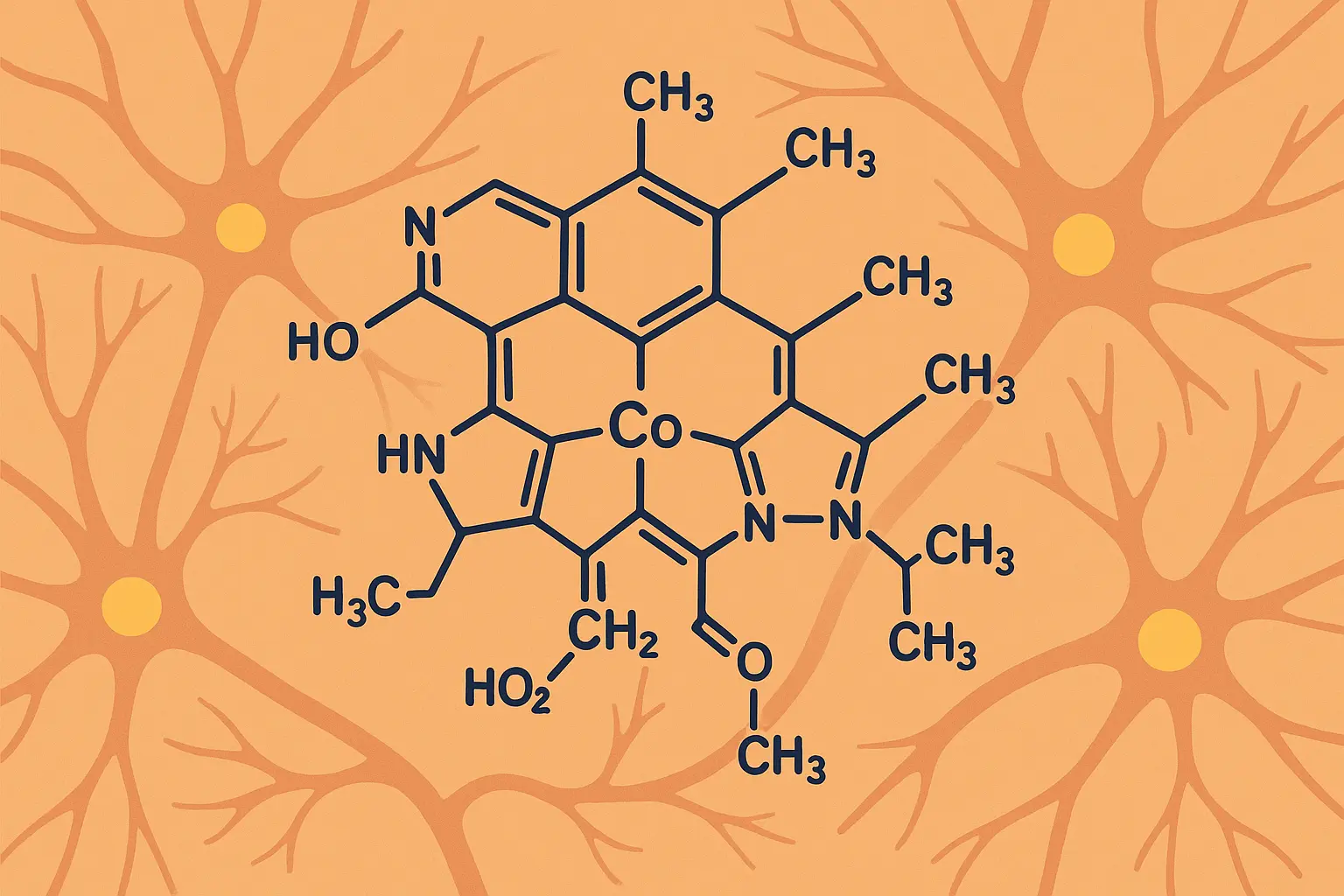
Your Brain’s Feel-Good Chemical Kitchen: The B12 Connection
Think of your brain like a busy restaurant kitchen that never closes. B12 is like having enough prep cooks to keep up with orders during the dinner rush. It helps run a process that creates SAMe, which is basically your brain’s main ingredient for making feel-good chemicals.
This process directly affects three important brain chemicals that help keep anxiety at bay: serotonin (your mood stabilizer), dopamine (your motivation chemical), and GABA (your brain’s natural chill pill). Without enough B12, it’s like being short-staffed in the kitchen – everything gets backed up, orders get mixed up, and everyone (including you) gets stressed out.
Understanding how this affects your mental health is important, especially if you’re dealing with hypomethylation patterns that can make anxiety worse.
The SAMe Connection: Your Brain’s Calm Button
Here’s where it gets interesting. B12 helps convert one brain chemical (homocysteine) into another (methionine), which then creates SAMe. This SAMe is what activates the process that makes serotonin – you know, that chemical that helps you feel good.
Without enough B12, this whole calming process breaks down. Your brain literally can’t make enough of the stuff that makes you feel okay.
Something to consider: You might want to ask your doctor about testing homocysteine levels along with B12. If homocysteine is above 10 μmol/L, this process might not be working well even if your B12 looks “normal.”
| B12 Status | Homocysteine Level | How Well It’s Working | Anxiety Risk |
|---|---|---|---|
| Great (>800 pg/mL) | <10 μmol/L | Really well | Low |
| Okay (400-800 pg/mL) | 10-15 μmol/L | Pretty good | Moderate |
| Low (200-400 pg/mL) | 15-30 μmol/L | Not so great | High |
| Really low (<200 pg/mL) | >30 μmol/L | Barely working | Very High |
The Genetic Wild Card
About 1 in 4 people have genes that make them process certain brain chemicals differently. It’s like having a slower drain in your sink – not broken, just different. These people are often more sensitive to B12 and might need higher doses to feel better.
Understanding your genetics can be really helpful, as discussed in personalized healthcare approaches that look at your individual makeup.
Worth exploring: Genetic testing for COMT variants can help you understand if you might need a personalized approach to B12.
I have a friend – let’s call her Sarah – who seemed to have it all together. Great job, nice apartment, Instagram-worthy life. But she was having panic attacks in grocery stores and couldn’t figure out why. After months of feeling like she was losing her mind, genetic testing showed she had a variant that meant she needed way more B12 than average. It wasn’t an overnight fix, but after a few weeks on a higher dose, she could actually enjoy her Saturday morning coffee runs again instead of dreading them.
When Your Brain Runs Out of Gas: The Energy Problem
B12 deficiency creates what I think of as an “energy crisis” in the parts of your brain that handle emotions. When these areas don’t have enough cellular energy, they can’t do their job of keeping you emotionally steady.
The result? Anxiety that feels impossible to control, no matter how much you try to think your way out of it.
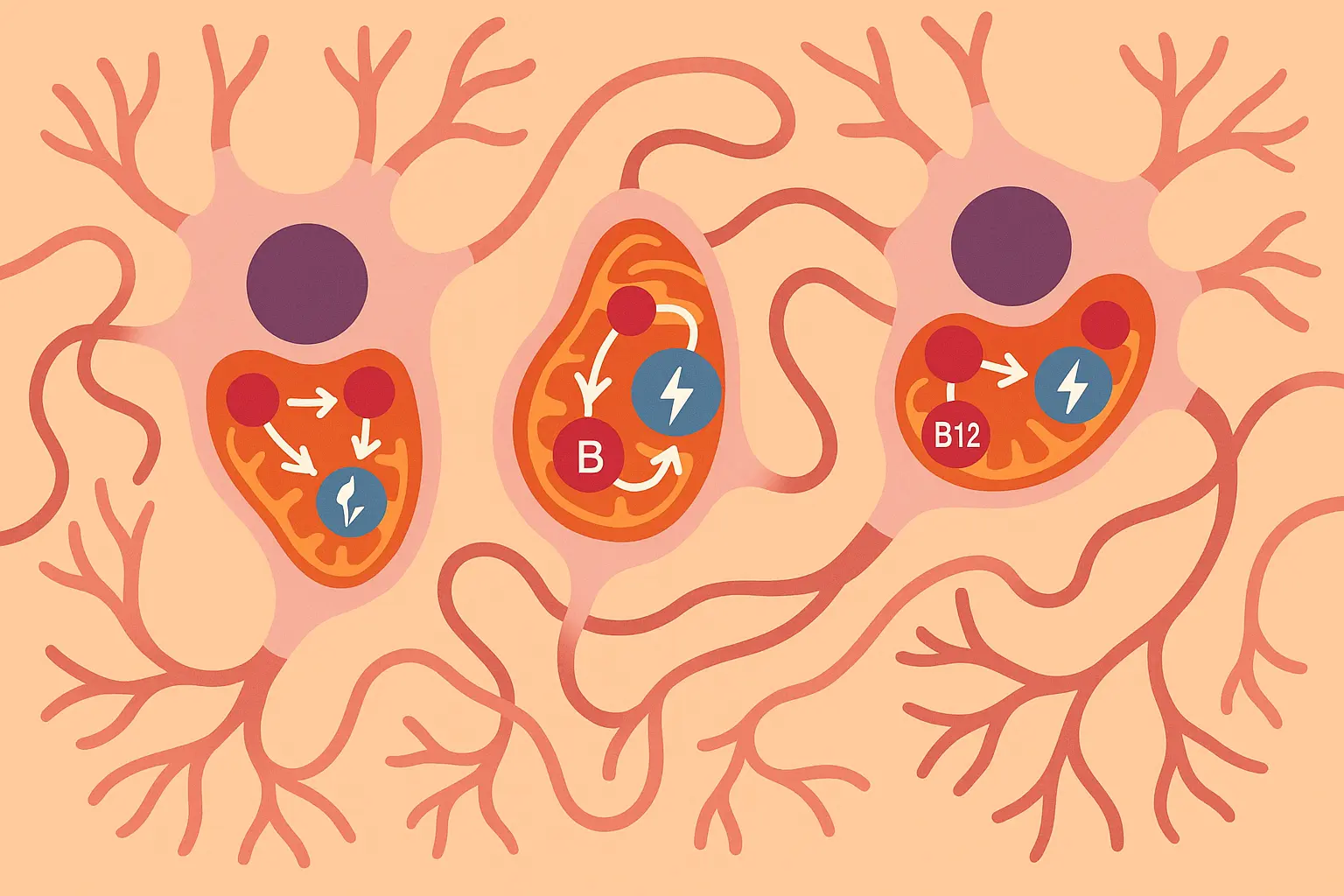
The Toxic Buildup Problem
B12 is needed for a specific step in how your cells make energy. When this step doesn’t work right, a toxic compound called propionate builds up. This stuff directly triggers anxiety by messing with your brain’s calming GABA receptors.
I’ve heard people describe this as feeling “poisoned by their own thoughts.” That’s actually more accurate than they realize.
Your Brain’s Information Highway
B12 helps maintain the protective coating around your brain cells. When this coating gets thin, your brain’s emotional processing slows down, creating a “lag time” that can make you feel overwhelmed and anxious.
Something to try: Track your anxiety symptoms alongside how quickly you can think through problems to see if both improve together.
The B6 vs B12 Question: Do You Really Need to Choose?
People always ask me: is B6 or B12 better for anxiety? Honestly, this question kind of misses the point. These vitamins work as a team, just in different ways. Which one helps you more depends on where your specific issues are happening.
Recent research published in Human Psychopharmacology showed that “High-dose supplementation of Vitamin B6 decreases anxiety” News-Medical, with people taking 100mg of B6 daily showing real improvements in anxiety after about a month.
But here’s what that research doesn’t tell you: B6 seems to work best when your B12 levels are already in a good place.
The Dynamic Duo: How B6 and B12 Work Together
B6 and B12 team up in a process that converts one brain chemical to another and eventually helps make glutathione – your brain’s most powerful stress-fighting antioxidant. Neither vitamin can do this job alone.
For comprehensive anxiety support, many people find it helpful to combine B vitamins with calming compounds like GABA supplementation to boost the brain chemical benefits.
The GABA Production Line
B6 is needed for the process that converts glutamate (which revs you up) to GABA (which calms you down). Without enough B6, all the B12 support in the world won’t help you make enough GABA to feel calm.
A simple approach: Try a 2:1 ratio – for every 1000mcg of B12, make sure you’re getting about 50mg of the active form of B6 (called P5P).
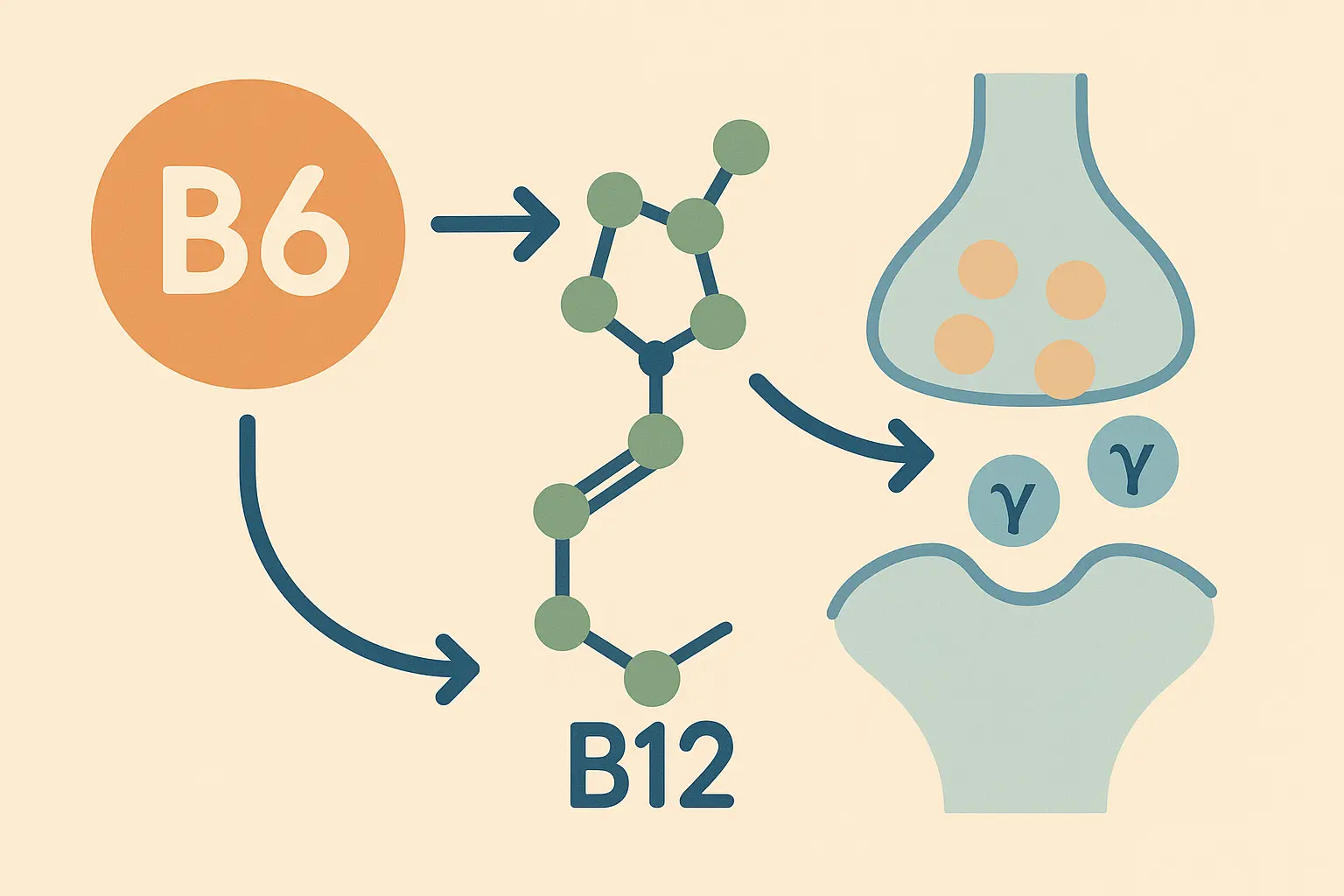
Finding Your Type
Your individual anxiety pattern can help determine whether B6 or B12 deficiency might be your main issue. People who undermethylate (don’t make enough of certain brain chemicals) usually need more B12, while those who overmethylate might respond better to B6.
The Histamine Clue
High histamine people (often undermethylators) usually get anxiety relief mainly from B12, while low histamine people might find B6 more helpful.
Worth checking: Test whole blood histamine levels. Above 70ng/mL suggests you might need B12 more, while below 40ng/mL might mean B6 is more important for you.
My friend Mark is a software developer who had racing thoughts and social anxiety. His histamine levels were high (85ng/mL), so he focused on B12 first (2000mcg methylcobalamin daily) rather than B6. His anxiety got way better within about 6 weeks, and his follow-up histamine test dropped to 65ng/mL.
Why Your B12 Supplements Might Not Be Working
Here’s where it gets frustrating. The connection between your gut and brain plays a huge role in B12 absorption, and anxiety itself creates a vicious cycle where stress makes it harder to absorb the very vitamin B12 and anxiety relief you need.
This explains why so many people don’t respond to regular B12 pills. Your anxiety might literally be blocking your recovery.
The Stress-Absorption Trap
Chronic anxiety reduces stomach acid and something called intrinsic factor, creating a cycle where anxiety prevents the B12 absorption needed to help with the anxiety. Bodies are weird like that.
It’s frustrating, but understanding this helps explain why standard supplements often don’t work.
How Stress Messes with Your Stomach
High cortisol from chronic anxiety directly affects the cells in your stomach that produce both acid and intrinsic factor, reducing B12 absorption by up to 40%. Your stress is literally blocking your recovery.
Something to consider: Sublingual methylcobalamin (under the tongue, around 5000mcg daily) or B12 shots might bypass your stressed-out gut absorption.
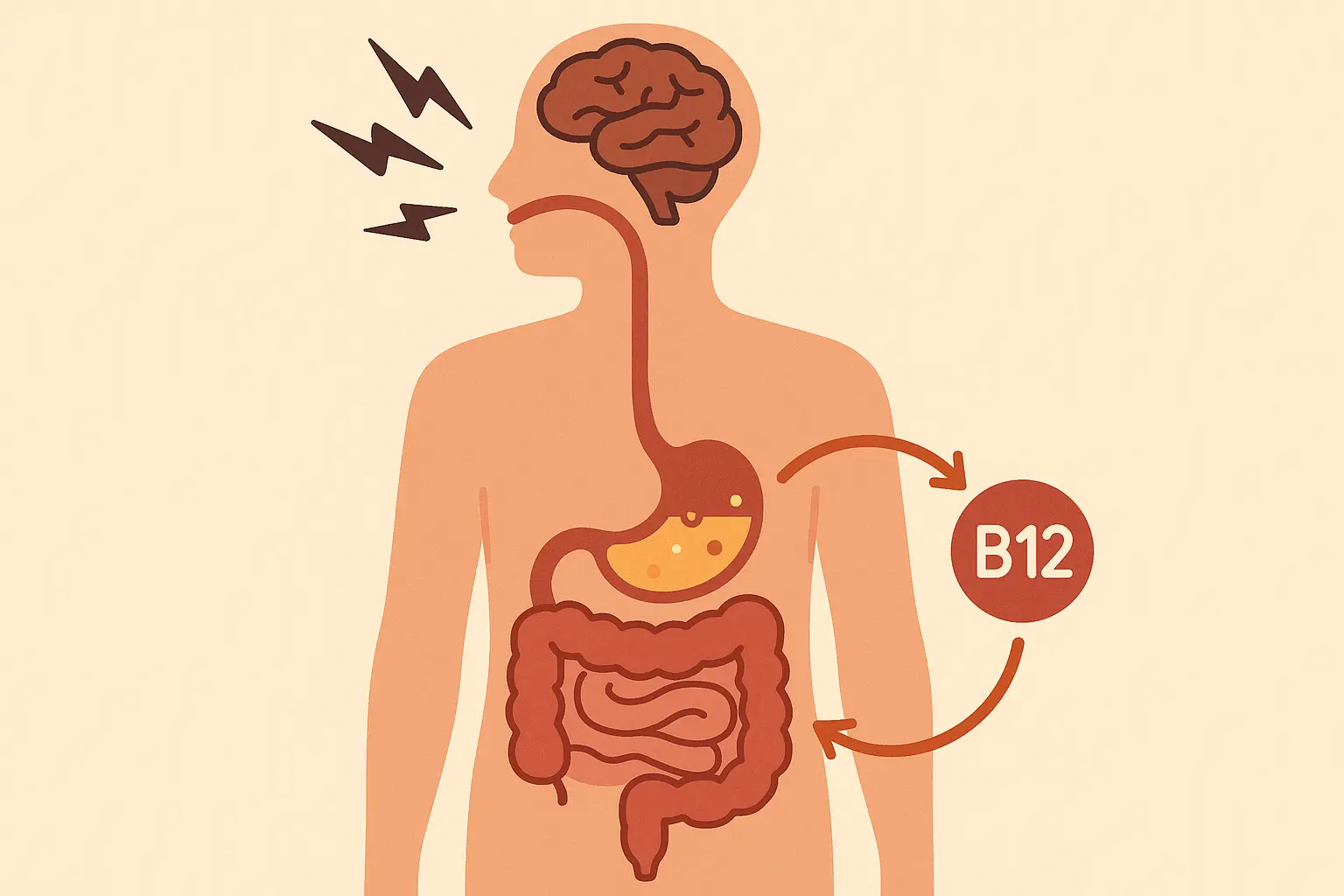
Your Gut Bacteria Are Playing Both Sides
Some gut bacteria make B12, while others use it up. Anxiety-related changes in your gut bacteria often favor the B12-using species, creating a shortage despite getting enough in your diet.
The Missing Microbe Connection
Low populations of a beneficial bacteria called Akkermansia muciniphila (which is common when you have anxiety) correlate with poor B12 status because this bacteria helps maintain the gut barrier you need for proper B12 absorption.
Worth trying: Support this bacteria with targeted prebiotics like cranberry extract and green tea compounds alongside B12 supplementation.
According to research published in the Journal of Neuropsychiatry, adults need about 2.4 mcg of vitamin B12 daily, but the best sources include liver and beef providing 60 mcg for 3 ounces, and clams with 84 mcg for 3 ounces. Wise Mind Nutrition
When Bacteria Steal Your B12
Small intestinal bacterial overgrowth (SIBO) creates bacterial competition for B12, often requiring 10-50 times higher doses to get therapeutic blood levels. This might explain why standard doses don’t help you.
If nothing’s working: Consider asking about SIBO breath testing if anxiety persists despite B12 supplementation.
B12 Absorption Optimization Ideas:
- Get tested for SIBO if regular B12 doesn’t help
- Support stomach acid with betaine HCl
- Try B12 under the tongue or via injection
- Address gut inflammation with probiotics
- Avoid acid-blocking medications when possible
- Look into intrinsic factor support supplements
Finding Your Right Dose: What Actually Helps with Anxiety
Before we dive into doses and timing, let me be crystal clear: I’m not a doctor, and this isn’t medical advice. Also, B12 isn’t going to cure your anxiety overnight, and it might not help at all
Before we dive into doses and timing, let me be crystal clear: I’m not a doctor, and this isn’t medical advice. Also, B12 isn’t going to cure your anxiety overnight, and it might not help at all. Some people see changes in a few weeks, others take months, and some don’t notice much difference. That’s just the reality of how our bodies work.
Standard B12 dosing recommendations completely ignore what might be needed for anxiety relief. Doses for brain and nerve support (1000-5000mcg) are often much higher than what most people take for general health.
For those starting their B12 journey, understanding proper approaches is important, which is why many find success with B12 injection therapy for reliable absorption and dosing.
Why “Normal” Blood Levels Don’t Tell the Whole Story
“Normal” B12 blood levels (200-900 pg/mL) don’t necessarily reflect what your brain actually needs. For anxiety relief, optimal levels often need to be above 800 pg/mL, with many people needing levels above 1000 pg/mL to feel significantly better.
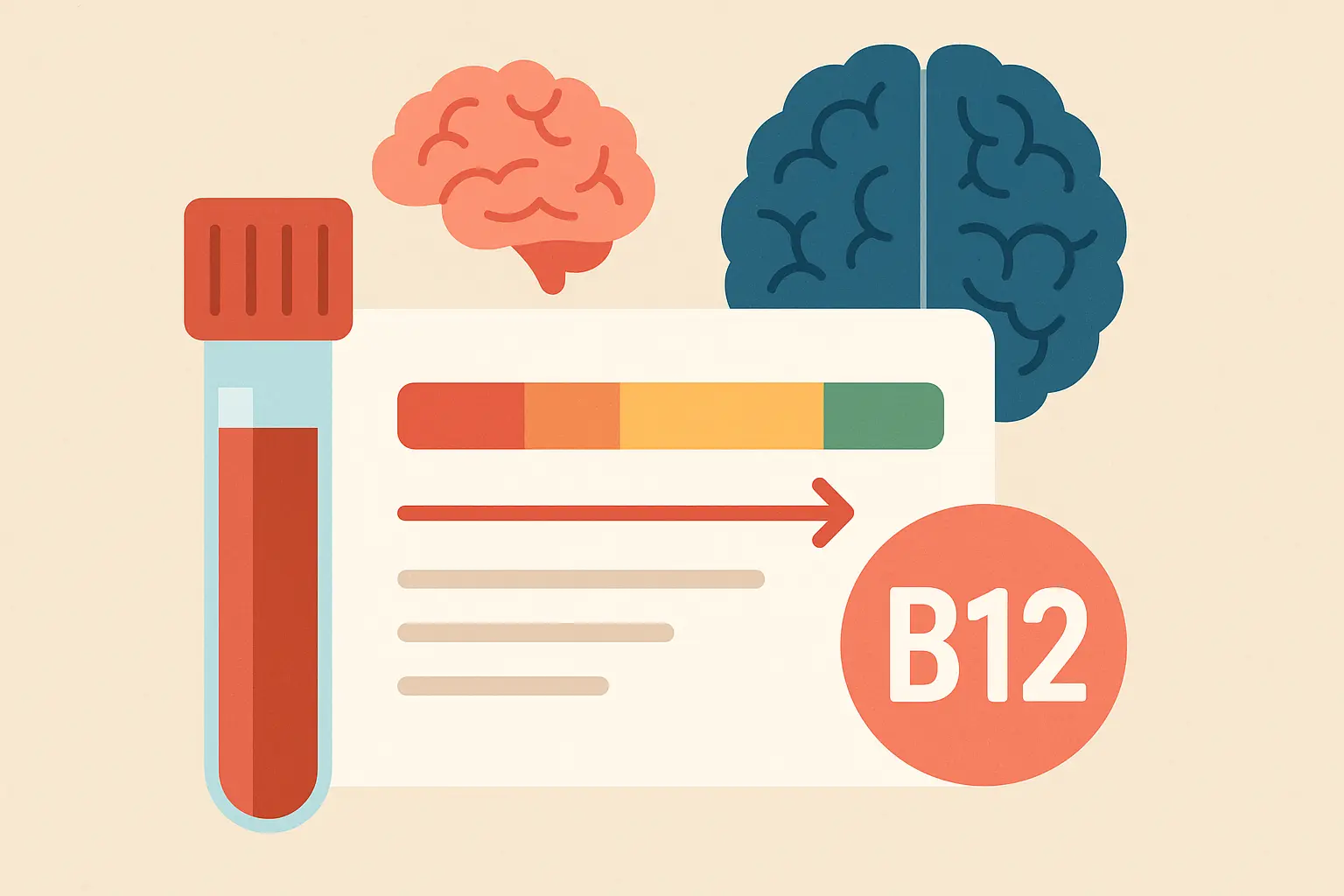
A Better B12 Test
Serum B12 can look normal while your cells are still deficient. Something called methylmalonic acid levels above 0.4 μmol/L indicate your cells aren’t getting enough B12 regardless of what your blood levels show.
Worth asking about: Always test methylmalonic acid alongside B12. Levels should be below 0.27 μmol/L for optimal brain function.
| Test Type | Optimal Range | Functional Deficiency | Anxiety Risk Level |
|---|---|---|---|
| Serum B12 | >800 pg/mL | 200-400 pg/mL | Low to High |
| Methylmalonic Acid | <0.27 μmol/L | >0.4 μmol/L | Direct correlation |
| Homocysteine | <10 μmol/L | >15 μmol/L | Moderate to High |
| Holotranscobalamin | >50 pmol/L | <35 pmol/L | High |
The Injection Option
Some people swear by B12 shots, others think they’re overkill. The honest truth? They work faster because they skip your digestive system entirely, often providing anxiety relief within 24-48 hours of the first shot. But they’re also more expensive and involve needles, so it’s really about what feels right for you.
If you’re curious: Consider bi-weekly 1000mcg methylcobalamin injections for 4-6 weeks, then move to weekly maintenance based on how you respond.
I know someone – let’s call her Jennifer – who’s a teacher. Her B12 levels looked “normal” (450 pg/mL) but she still had severe anxiety. Her methylmalonic acid was high at 0.6 μmol/L, showing her cells weren’t getting enough. After starting weekly B12 shots, her anxiety decreased by about 70% within a month, and her methylmalonic acid normalized to 0.2 μmol/L.
When to Take B12: Timing That Actually Makes Sense
You know that feeling when you wake up and immediately start worrying about your day? That’s partly because your stress hormone (cortisol) naturally spikes in the morning. Taking B12 before this happens – like with your first cup of coffee – might help your brain handle that daily stress surge better.
When you take B12 can really impact how well it works for anxiety. Most people take it randomly, missing the important morning window when your brain’s demand for these processes peaks and anxiety protection is most needed.
Understanding circadian rhythms is important for anxiety management, and combining B12 timing with proper sleep hygiene protocols can really improve both sleep quality and next-day anxiety resilience.
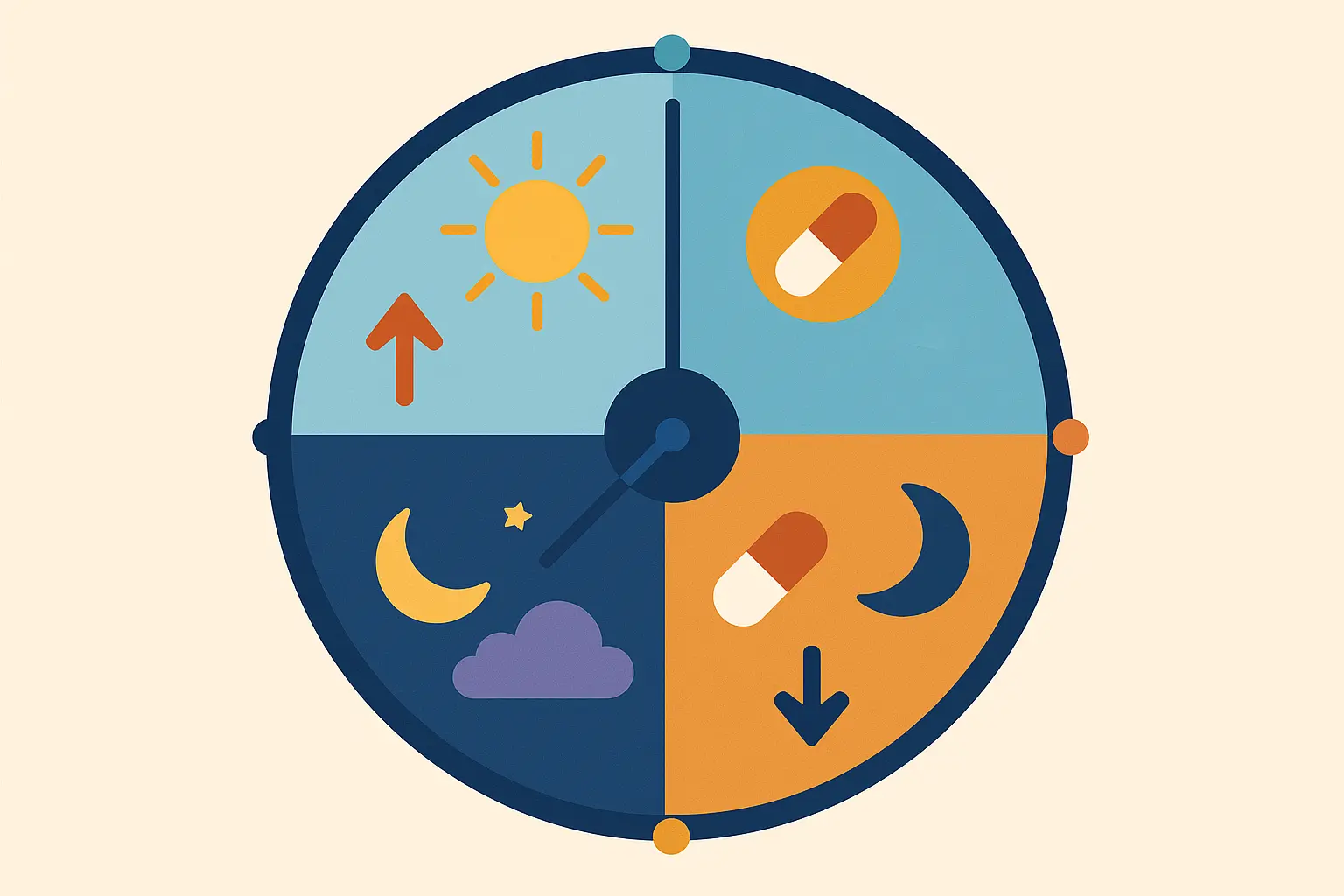
Working with Your Natural Stress Cycle
Your morning cortisol spike creates a huge demand for the brain processes that make calming chemicals. Taking B12 30-60 minutes before your natural cortisol peak (usually 6-8 AM) might provide better anxiety buffering throughout the day.
The 4 AM Wake-Up Club
If you’re one of those people who wakes up at 3 or 4 AM with your mind racing (welcome to the club), this might be because your brain runs out of the good stuff while you’re sleeping. Some people find that taking B12 at bedtime helps them sleep through the night instead of waking up in panic mode.
Worth trying: Take 1000mcg under-the-tongue methylcobalamin at bedtime if you experience those awful early morning anxiety wake-ups.
Medical experts are increasingly recognizing the psychological impact of B12 deficiency, with “Can vitamin B12 deficiency make you guilty all the time?” OnlyMyHealth reporting that persistent guilt and mood issues may be linked to B12’s important role in maintaining nerve and brain health.
The Sleep-Anxiety Connection
B12 supports melatonin production through the same process that makes other brain chemicals. Evening B12 can improve both sleep quality and next-day anxiety resilience, creating a positive cycle instead of the usual anxiety-insomnia trap.
Something to try: Split your daily B12 dose – 60% in the morning, 40% at bedtime for better around-the-clock support.
B12 Timing Ideas That Make Sense:
- Morning dose: 60% of daily B12 (30-60 min before your stress peak)
- Evening dose: 40% of daily B12 (with dinner)
- For early morning anxiety: Extra 1000mcg at bedtime
- Pre-workout: Extra B12 with magnesium 30 min before exercise
- Track timing with anxiety symptoms for 2 weeks
- Adjust based on your individual patterns
Exercise Without the Anxiety Crash
Physical stress from exercise creates an acute demand for these brain processes that can trigger post-workout anxiety in sensitive people. Taking B12 before workouts can help prevent these crashes and help you maintain the mental health benefits of exercise.
Why Exercise Sometimes Backfires
Exercise can increase lactate, which can trigger panic responses in some people. B12’s role in how your cells make energy reduces lactate production and subsequent anxiety responses, making exercise feel good instead of scary.
Worth trying: Take B12 with magnesium glycinate 30 minutes before workouts to optimize energy processes and prevent exercise-induced anxiety.
Research shows that folic acid levels were significantly lower in patients with depression than those with anxiety (p=0.04), and there was a significant relationship between folic acid levels and depression severity scores among patients with severe depression (r=-0.250, p=0.049). Journal of Neuropsychiatry
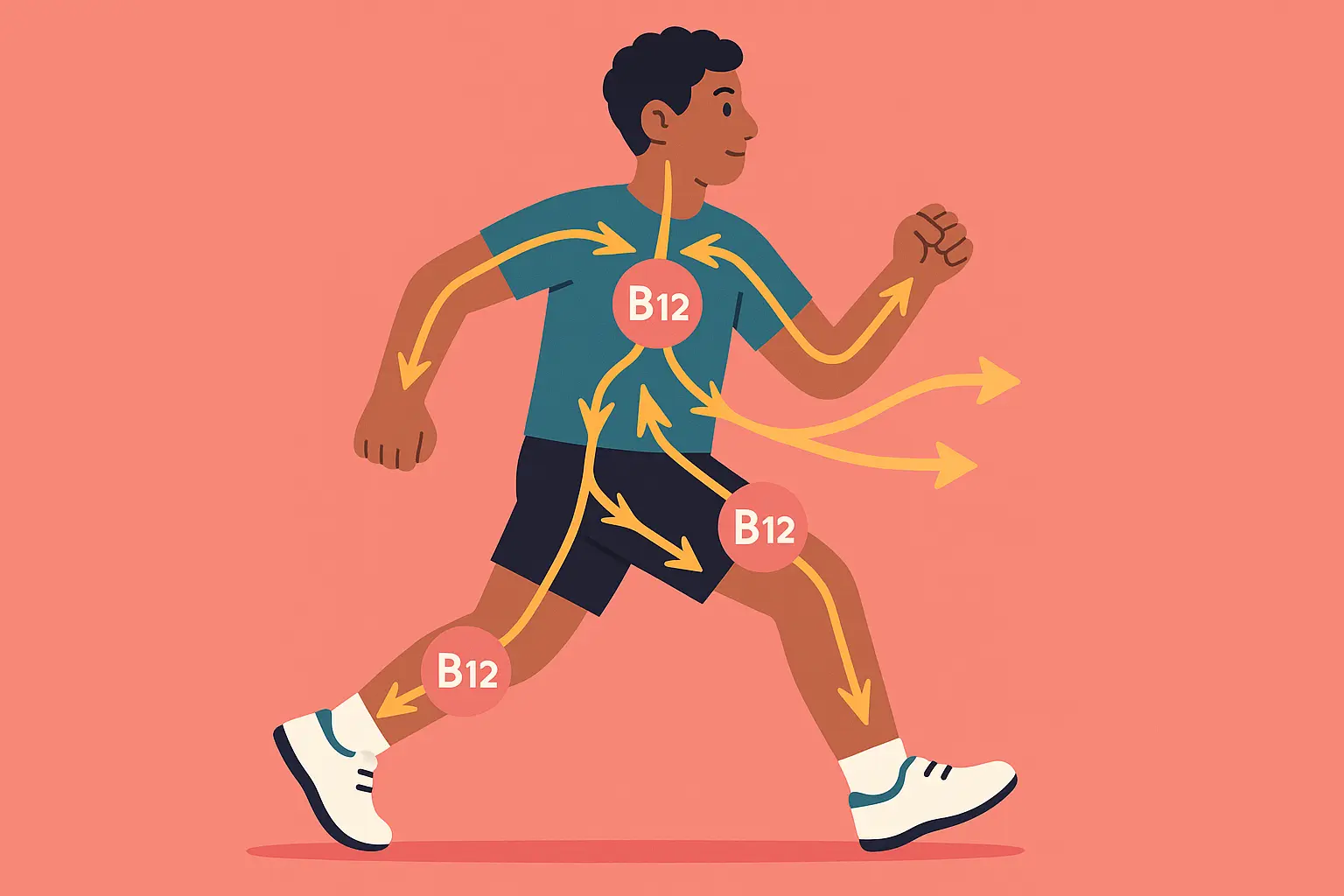
Understanding B12’s role in anxiety requires more than just generic supplementation – it needs a personalized approach based on your unique situation. Enov.One’s comprehensive telemedicine approach addresses this complexity through advanced testing and tailored B12 injection protocols specifically designed for anxiety relief. Their board-certified physicians understand that anxiety-focused B12 therapy requires specialized knowledge of these brain processes and chemical production. With pharmaceutical-grade methylcobalamin injections delivered to your door and ongoing monitoring, you’ll get the sustained anxiety relief that comes from truly personalized care.
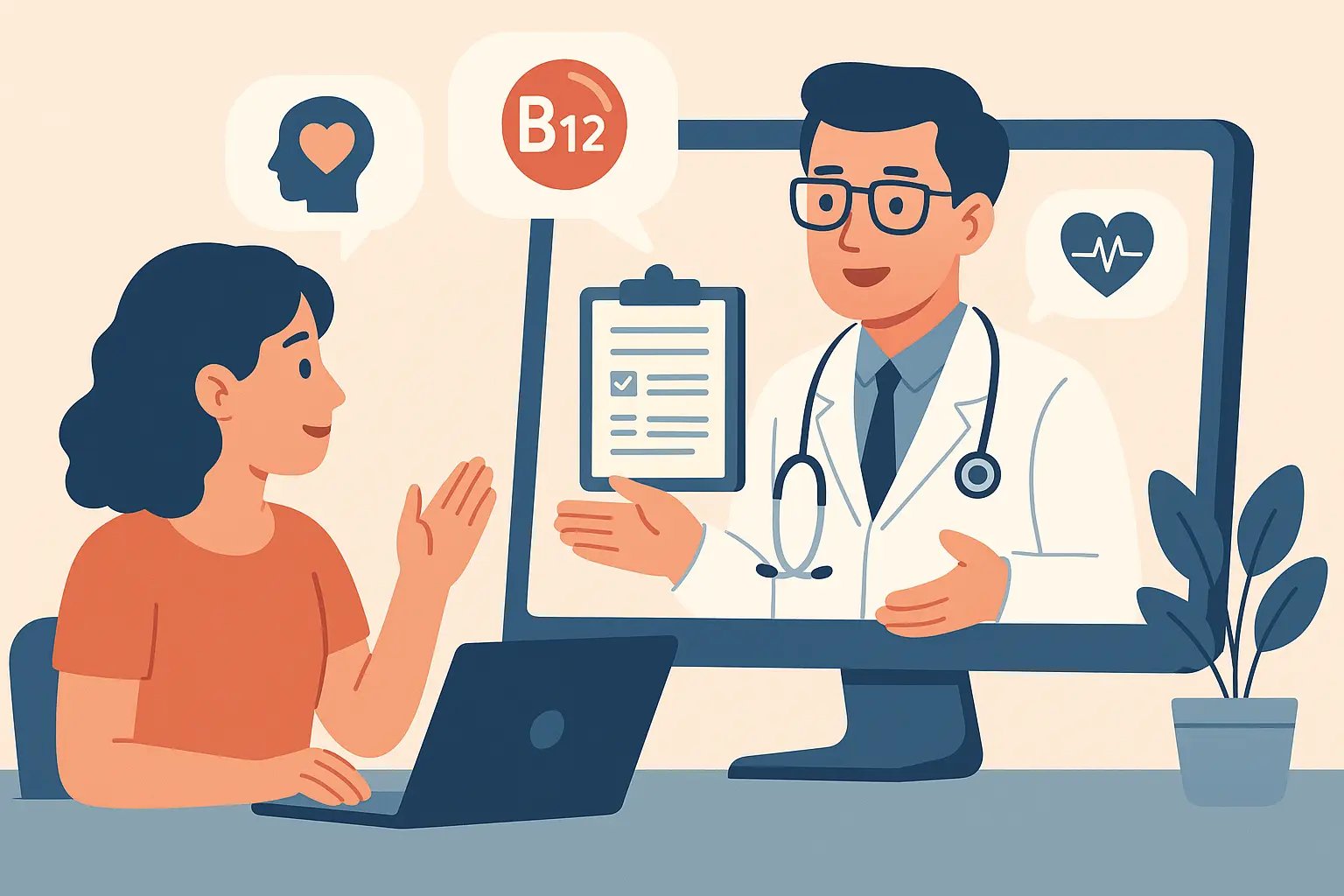
Final Thoughts
Look, I wish I could promise that B12 will fix your anxiety. But what I can tell you is that for some people – maybe you, maybe not – it’s been a piece of the puzzle. And even if it only helps a little, a little can be enough to make your days feel more manageable.
B12 for anxiety isn’t about taking a vitamin – it’s about understanding and supporting a complex system that directly affects your brain’s ability to stay calm. The brain processes, cellular function, and chemical production all depend on adequate B12, but “adequate” for anxiety relief often means much higher doses than standard recommendations.
Your gut health, genes, timing, and individual makeup all play roles in whether B12 will help transform your anxiety or leave you disappointed. The key is moving beyond one-size-fits-all approaches to find your personal B12 strategy, whether that’s addressing absorption issues, optimizing timing, combining with B6, or using injections to bypass gut problems entirely.
The most important thing I’ve learned? You’re not imagining your symptoms, you’re not weak for needing help, and you’re definitely not alone in this. Whether B12 ends up being helpful for you or not, keep looking for what works. You deserve to feel better.
And hey, if you try this and it helps, or if it doesn’t work at all, that’s useful information too. We’re all just figuring this out as we go.
Most importantly, don’t give up if standard B12 supplements haven’t worked – the right approach for your unique situation might make the difference between living with anxiety and finally feeling the calm your brain is capable of. Just remember – there’s no shame in needing help, whether that’s from vitamins, therapy, medication, or all of the above.
